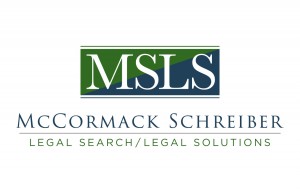This is the second post in our recruiter series where we ask legal recruiters for their insider tips and job seeker advice.
This Q&A is with Gay Rineberg Schreiber of McCormack Schreiber. McCormackSchreiber is a longtime leader in the Chicago legal market and is proud to have made nearly 1000 law firm and in-house placements.
What skills are most in demand in the legal industry right now?
The skills most in demand in the legal industry right now are demonstrated business acumen and the ability to develop clients/business.  As for substantive practice area skills, the transactional areas are most active and transactional skills are particularly in demand.
Where are the biggest growth areas?
As noted above, the biggest growth is in the transactional areas, including real estate, M&A and private equity, and other growth areas include privacy and information technology, as well as healthcare.  Litigation has remained fairly steady, though we have seen an increased demand recently.
What traits are your clients looking for in candidates?
Our clients are always seeking strong legal skills, a great attitude and motivation to succeed.  For our more junior candidates, our clients want to see excellent writing and strong communication skills.  For our more experienced candidates, our clients are looking for people with great client relations/people skills, the desire and ability to develop business, and the ability to work well with others and collaborate as a team.
What’s the biggest mistake candidates make in the recruitment process?
The biggest mistakes that lateral candidates make in the recruitment process are failing to tailor their message (including resumes and interviews) to a particular client’s needs; being indecisive or projecting a lack of interest to the client, which can be the case when a candidate drags his/her feet and waits too long to follow through with next steps in an interview process; and not being open and honest with the recruiter so as to better allow the recruiter to assist the candidate through the search and interview process.
What’s the coolest job you ever recruited for?
We have been in business for close to 20 years (in June!) so it is difficult to select just one “coolest” job!  That said, while people outside of law may not believe it, many of our jobs have a “cool” element to them.  Some of our law firm clients are boutiques/spin offs with particularly unique and cohesive cultures that have more of an entrepreneurial feel to them.  In the in-house arena, in addition to our more traditional large public company searches, our searches have included new and dynamic companies in the start-up process, and tech companies with pool tables in their offices – many of which offer “cool” options for our candidates.
Do you have any career advice for our readers?Â
My career advice for attorneys – even at the junior-level – is to decide the area of practice you enjoy most and best utilizes your skills, and to focus your career accordingly, trying to make yourself a “go-to” for this area.  Further, as business development is becoming more and more important, attorneys should start networking early and often in their career, staying in touch with law school classmates, former colleagues, etc., all of which should pay off when it comes to developing your own business and clients, giving you more career options in the future.
Finally, keep a working document of your resume (and as you get more experienced, representative transactions and engagements lists).  If you learn of a new position that could be a great career move, you want to be prepared to move quickly with the best and most accurate presentation of your experience and skills.
Start your job search with Lawjobs.com today.
More about McCormack Schreiber
McCormack Schreiber Legal Search is Chicago’s premier attorney search firm, and with 8 attorney recruiters we are also one of Chicago’s largest search firms.  Since 1998, we have successfully placed experienced attorneys of all levels and practice areas at top large, midsize and boutique law firms, and at national and international corporations.  Our affiliate company, McCormack Schreiber Legal Solutions, assists our law firm and corporate clients with paralegal hiring as well as contract attorney and other legal staffing needs.   McCormack Schreiber is a longtime leader in the Chicago legal market, and we are proud to have made nearly 1000 law firm and in-house placements.










